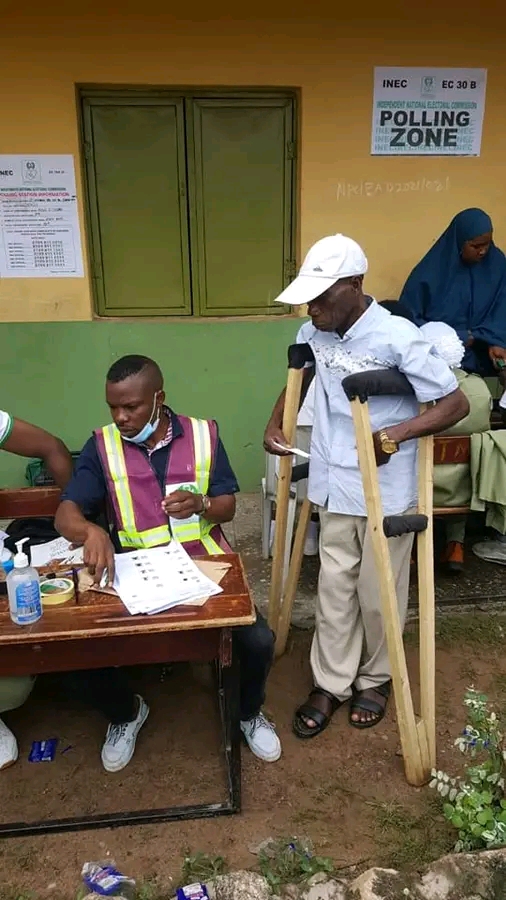On Saturday, June 18, 2022, The Inclusive Friends Association (IFA) on the Access Nigeria Campaign deployed mobile observers to all the 16 Local Government Areas (LGAs) in Ekiti State.
The observers observed the deployment of poll officials, accreditation & voting process, the deployment of election assistive material to aide voting for Persons with Disabilities (PWDs) and shared reports on the general conduct of the election at the polling units’ level.
Below are bullet points of our findings: – The Bimodal Voter Accreditation System (BVAS) functioned efficiently in all polling units-
There were no ramps nor handrails for use by PWDs outside most of the polling units situated on high veranda and culverts-
Most polling units were located in public buildings (Schools), town halls, open spaces, front of popular junctions or private houses-
Voters with Disabilities experience difficulties at voting points due to barriers like corridors and steps-
Most ballot boxes are situated on high tables n floors, hence PWDs find it difficult to participate-
Form EC40H was available at all polling units observed. however, the usability of the form by polling officials was not effective- 61% of polling units observed had braille ballot guide- 66% of polling units observed has Form EC30E PWD poster- 76% of polling units observed had Form 40H (PWD Voter Information & Statistics)-
Priority Voting was announced and duly observed at Polling Units observed-
Magnifying glasses for Persons with Albinism was not available for use-
Secrecy of the ballot was compromised in some polling units observed-
There Vote buying was vote buying in some polling units observedRecommendations-
INEC should ensure that newly created polling units are accessible to PWDs and to relocate previously created polling units that are inaccessible.-
INEC should strengthen the training of regular and ad hoc staff to effectively administer accessible Election Day materials and accommodations for voters with disabilities. –
INEC should continue to engage and consult with the disability community, including IFA, to identify areas to be improved for more inclusive electoral processes.-
The Federal and State Governments to work with various agencies and the private sector to ensure that public buildings are built and renovated by the 2023 deadline as mandated the Discrimination Against Persons with Disabilities (Prohibition) Act of 2018.-
The Executives, at all levels, should strengthen existing building codes and enforce them to guarantee accessibility for PWDs during and beyond elections. –
The National Assembly should ensure that the executive implements specific sections of the Discrimination Against Persons with Disability Act 2018 through effective legislative oversight.-
The National Assembly should also perform its oversight functions of INEC to ensure that all measures for accessibility are implemented in line with the Discrimination Against Persons with Disability Act 2018. –
The Police and other security agencies to develop a special protocol to protect voters and observers with disabilities during elections.-
The police and other security agencies to ensure that whenever these protocols are developed, their personnel are well trained to implement these provisions. –
The Security agencies should consider collaborating on a mobile court system for on-the-spot trial and prosecution of all those caught for vote-buying and other electoral-related offenses to serve as a deterrent for other citizens.-
The media should make deliberate efforts to conduct voter education that compliments the efforts of Organizations of Persons with Disabilities in promoting the participation of PWDs in Nigeria’s electoral and political processes-
Media executives should consider disability inclusion in their broadcast and news production to promote inclusive practices in Nigeria including the consistent utilization of sign language interpretation.-
Elections Focused Civil Societyshould increase sensitization on the danger of vote-buying and the implication for their future. –
CSOs should continue to engage with the disability community to ensure their efforts are inclusive and provide opportunities for PWDs to contribute to their work either as advisors to ensure a disability lens on their work or by including PWDs as participants in activities.


